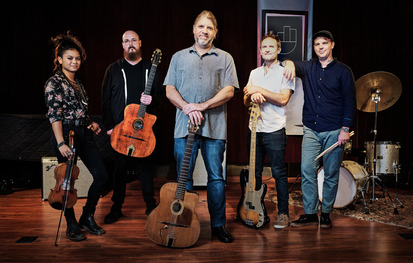by Mike Telin

Growing up in Fontainebleau, France, Stephane Wrembel began studying classical piano at the age of four. By his mid-teens his musical inspirations were found on the guitar — and in rock.
“I told my teacher, who was a great Django player, that I wanted to study jazz. He said, ‘Let’s start with a couple of Django songs.’ He started to play, and I was like, wow!” The song Wrembel’s teacher played was Django Reinhardt’s classic Minor Swing. And from then on, Wrembel never looked back. Today, he is perhaps the most celebrated guitarist in the world specializing in the style of Django Reinhardt.
On Sunday, April 24 at the Bop Stop, Wrembel will be joined by his longtime bandmates Josh Kaye (guitar), Ari Folman-Cohen (bass), Nick Anderson (drums), and Daisy Castro (violin) for shows at 6:00 pm and 8:00 pm. The setlist will include Wrembel’s original compositions as well as music from his latest release, The Django Experiment VI. Tickets are available online.
Although this is not Wrembel’s first appearance in Cleveland — he often played at Nighttown — Sunday’s shows will be his Bop Stop debut. “I’ve heard great things about it and I’m excited to play there,” the guitarist said during a recent telephone conversation.
A student of his craft, in 2019 Wrembel released Django L’Impressionniste, featuring seventeen of Reinhardt’s preludes for solo guitar, which was followed by a book of Django transcriptions in 2021. Since 2003 he has produced the Django a Gogo Festival, which celebrates the Sinti guitar style — Reinhardt was a Sinti, a Roma group from Western Europe. As a composer, Wrembel is perhaps best known for his composition Bistro Fada from the Academy Award-winning film Midnight in Paris.
What was it about Django’s music that captured Wrembel’s attention? “After hearing my teacher play, I thought that if I wanted to study jazz I needed to buy some jazz records, and the first one I bought was a Django recording. I remember hearing his solo on Minor Swing, which was the song that my teacher was showing me. To me it was mind-blowing because I didn’t understand how some of the notes he played were even possible — I thought, what is that? What is he doing? I’ve never heard such things. Then I started transcribing some of his music, and it was a weird feeling — it seemed like it came from another planet.”
Wrembel was also struck by what he heard at the Django Reinhardt Festival, which is held near Fontainebleau.
“I was able to see the Gypsies perform live, but the thing that struck me was to see someone take the guitar and start strumming, and another person sitting down and starting to play, and before you knew it there were four or five people playing a Django song. There was a sense of spontaneity along with a super high level of playing that I really liked. I’m trying to give you an explanation that is rational, but it’s not rational at all. It was like getting hit in the back of the head, and that’s it — you’re struck by it.”
While you can hear the influences of Reinhardt, jazz, blues, classical, swing, flamenco, and rock in Wrembel’s music, he wholeheartedly, if not vehemently, rejects classification.
“My music is very difficult to define,” he said. “You have to understand that Django is to the guitar what Bach is to the keyboard. You study Django and you get better at what you do no matter what. My compositions are more — conceptual. There’s always a frame of a story behind them. But music is a personal act. When you listen to Miles Davis, you’re not listening to jazz, you’re listening to Miles Davis expressing himself.”
One thing that is certain, Wrembel has the utmost respect for his bandmates. He noted that he has worked with bassist Ari Folman-Cohen since 2006, drummer Nick Anderson since 2011, and guitarist Joshua Kaye off and on for the past five to ten years.
“And Daisy Castro is still very young, only 25. She’s an incredible violin player, and I met her for the first time when she was 15. It’s an amazing band — one of the most in-demand in New York City. They can play anything, so people are in for a treat.”
And how does Wrembel feel about using the term Gypsy jazz when referencing Reinhardt’s music? “Personally I call it Django’s music or jazz, but it’s really Django’s music. I don’t like the words Gypsy jazz myself. Not because I find the word offensive, I don’t like the term because it then becomes a product — people are trying to sell those words — and that I don’t like. Django started playing jazz, but during his lifetime it became Django. So I frown upon the term Gypsy jazz because I think it is a misplaced conception of the nature of his music.”
Published on ClevelandClassical.com April 20, 2022.
Click here for a printable copy of this article



